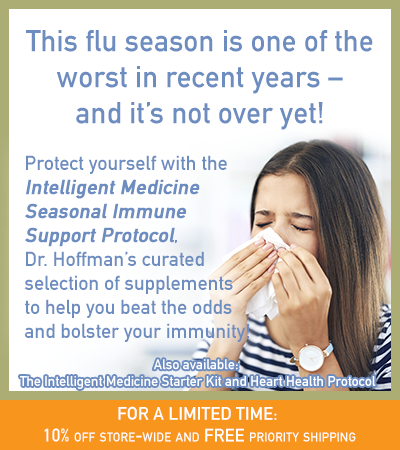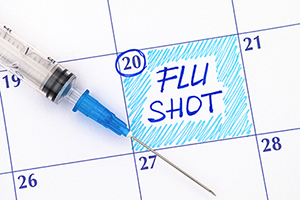I get tons of questions from listeners and patients about whether they should receive the flu shot. My stock reply: “I’m agnostic.” There could be certain benefits, which are slight, in terms of protection. But they may be outweighed by the downsides, which are rare, and not consistently reported. I’ve been hesitant to join the ranks of hard-core “anti-vaxxers” because the argument for and against vaccines is complex and nuanced.
Also, as a health “influencer” with a high public profile, I’m expected to lock-step with “responsible” medical experts who advise getting the shots. I’ve taken some controversial positions in my medical career, but no issue has threatened such a “third-rail” effect as my occasional wavering on vaccines. Questioning vaccines has been equated with Holocaust Denial. After posting some of the information I’m about to share with you here, one nurse commented on my Facebook page “Healthy children in my city are dying and you are spreading dangerous misinformation.”
But this year’s flu epidemic has almost turned me into a flu vaccine atheist.
After multiple public health fiascos, ranging from approval of many ineffective and downright dangerous drugs, to endorsement of a low-fat diet paradigm that has turned the populace obese and diabetic, it’s understandable that wary medical consumers mistrust the powers-that-be. In the face of this year’s miserable performance of the flu shot, authorities seem especially dumb to merely double-down on the tired mantra: “It’s not too late to get the flu shot.”
Estimates of the efficacy of the flu shot have ranged as low as 10%. But a more accurate—if potentially self-serving—assessment has just been released by the Centers for Disease Control’s Office of Flu Vaccine Effectiveness. It’s not pretty. The flu vaccine is only about 25% effective against the predominant H3N2 Strain. It does slightly better against influenza B (42%); against influenza A (H1N1) it’s 67% effective.
The shot is said to protect against flu death, but still 26% of fatalities occurred in vaccinated children. There’s weak evidence for milder disease in flu shot recipients who were children or adults 18-49, but no symptom reduction was seen in 50+ individuals, key targets of the vaccine campaign.
For perspective, I turned to the authoritative Cochrane Collaborative which bills itself as “a global independent network of researchers, professionals, patients, carers, and people interested in health…We gather and summarize the best evidence from research to help you make informed choices about treatment.”
As stated in the Cochrane’s assessment, “Vaccines to prevent influenza in healthy adults” updated at the end of 2016, a year in which vaccine efficacy surpassed this year’s miserable results:
“Injected influenza vaccines probably have a small protective effect against influenza and influenza-like illness ILI (moderate-certainty evidence), as 71 people would need to be vaccinated to avoid one influenza case, and 29 would need to be vaccinated to avoid one case of ILI. Vaccination may have little or no appreciable effect on hospitalizations (low-certainty evidence) or number of working days lost. We were uncertain of the protection provided to pregnant women against ILI and influenza by the inactivated influenza vaccine, or this was at least very limited. The administration of seasonal vaccines during pregnancy showed no significant effect on abortion or neonatal death…”
In short, not a ringing endorsement of the flu vaccine. The astute reader might quibble that this study pertained to healthy adults; it could be argued it’s the sick, the elderly, and the immune-suppressed who are more vulnerable to the deleterious effects of a serious bout of flu, and deserve the shot. But this is precisely the problem with our current vaccine: it doesn’t “take” as well in individuals with compromised immunity. That’s why last year we pioneered use of an amped-up flu shot for seniors (Fluzone High Dose) with uncertain efficacy.
OK, fine. Maybe you’ll still get the flu, but at least you’re doing your patriotic duty to stanch the spread of the epidemic. That’s the rationale behind universal vaccination—a strategy which has worked well in eradicating diseases like smallpox and polio.
But a new study offers some disturbing data. Originally purposed to determine if people could transmit the flu bug merely by breathing rather than sneezing or coughing (the study said they could), it revealed something counter-intuitive: sick vaccinated individuals exhaled flu virus at 6.3 times the rate of sick unvaccinated persons! Anti-vaccine websites pounced on this finding to allege that the flu vaccine actually causes vaccinated persons to spread more virus.
This finding requires some context because it’s been quite controversial. Here’s what the article actually says:
“The association of current and prior year vaccination with increased shedding of influenza A might lead one to speculate that certain types of prior immunity promote lung inflammation, airway closure, and aerosol generation. This first observation of the phenomenon needs confirmation. If confirmed, this observation, together with recent literature suggesting reduced protection with annual vaccination, would have implications for influenza vaccination recommendations and policies.”
After vaccine critics picked up on this, one author of the original virus particle study was quick to downplay the claims that the flu shot could cause the flu to be spread more readily; he reaffirmed his support for the vaccine. Associated Press “fact-checkers” quickly characterized the stories as fake news and “shoddy science.”
But there’s really something to this. It could reasonably be postulated that vaccinated folks, after they get the shot, mount a more robust reaction to the virus, creating more lung inflammation, which leads to increased secretion of infectious aerosolized particles. Note that the authors of study themselves say that this finding, although preliminary, and admittedly based on a small sample, merits further investigation.
They also allude to the phenomenon by which it’s known that people who patriotically submit to annual flu shots fare less well than sporadic vaccine recipients. The notion is that a previous vaccine may produce antibodies that blunt some of the subsequent vaccine’s immune effects. On the other hand, a recent British study showed additional protection against death in elders who took the shot annually—so take your pick.
Of additional concern are studies that suggest that the flu shot, currently recommended for all pregnant women, might increase the risk for miscarriage. This undermines the rationale for the flu shot in pregnant women, who, rarely, can die from the flu; but it’s also thought that when pregnant moms catch the flu, it can hike their kids’ subsequent risk of schizophrenia. Conflicting studies make for an agonizing choice for mothers-to-be.
It’s time to factor in the known protective effects of certain nutrients like vitamin D, which singlehandedly may dwarf the efficacy of the vaunted vaccines. Among those initially low in vitamin D, for example, those receiving D supplements had 2/3 fewer colds and flus.
And, there are probably a lot of effective nutraceutical strategies that are dismissed by a medical establishment that’s myopically invested in vaccine technology as a flu panacea. Where are the research dollars allocated to their study? It’s not as if the flu shot, in existence for five decades, has produced an indisputable conquest.
Part of the reason for the vaccine’s lack of effectiveness is due to its old-fashioned manufacturing technique, which dates back to World War II. Millions of eggs are placed on conveyor belts and then injected with live virus. But even as they’re processed into attenuated (killed) vaccines, the unstable viruses have a chance to mutate. Newer techniques, only now beginning to be used, skip the egg stage.
What I’d like to see is more research to produce a safer and more efficacious flu vaccine. The science is not settled on this. Finding less toxic alternatives to adjuvants like mercury, aluminum and formaldehyde would be a start.
I’d also like to see studies on the nutritional status of flu sufferers—vitamins A, C, D, E, iron, selenium, zinc, glutathione, etc.—to see if they influence vaccine efficacy or overall flu severity. I’d start with autopsies on those who died of the flu—I’d wager nutrient deficiencies were at least partially to blame for their incompetent immunity.
Above all, we need to cool the rhetoric, because when staunch vaccine advocates and anti-vaxxers hurl invective at one another, we don’t advance the cause of science, which after all is aimed at reducing the toll of bad flu seasons like this.
NEXT WEEK: A critical look at Tamiflu.
I want to let all my readers know that I’ve heard your requests for focused advice on immune-bolstering supplementation loud and clear. In response, I’ve created the Intelligent Medicine Seasonal Immune Support Protocol – a curated list of my top recommendations for helping you keep your immune system in its best shape during this trying time of year. These are the same supplements I recommend to my patients and use myself. Click here to view the protocol.









